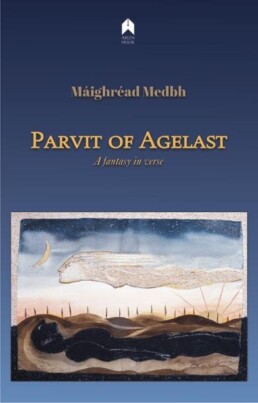This highly evolved verse novel, inspired by the flamboyancy of Pauline Bewick’s work, operates on several levels, as a documentary of faces which proffers an extreme spiritual purification, as the transfiguration of a tormented quasi-human substance, as a powerful critique of an environment where reality and experience diverge. Orwellian, Swiftian in the satiric bite of its allegory, a parable of genetic modification and cosmic meltdown, it is relieved by witty offhand prose asides, it bursts and wrests grammar and language to rise to sophisticated effects, like ‘she feel-knows’, ‘she peers at the marketplace like a pig at a butcher’s knife’. With its bizarre cast and victim-heroine it lends itself to a futuristic film or stage drama adaptation. It is highly 21st century and cunningly wrought
– Medbh McGuckian
Most of us, most of the time, live in a world governed by the dimensions and laws of an agreed fiction. From time to time, and usually by accident, we find ourselves bewildered by the raw mystery of existence, and face the terrors of the mind in freefall – a vertigo from which we quickly retreat. There is a comfort in the known, the already-agreed, the shared language, the shared (and largely unquestioned) consensus. Nevertheless, curious creatures that we are, there is always someone willing to push the boundaries – someone willing or driven to fantasise a world entire in itself, a withdrawal from the exigencies of this world we think we know, an utopia or dystopia to which we can retreat when the world becomes all too much for us. Máighréad Medbh has long been known as an astute, involved and incisive commentator on our world. Here she has made an entire world never before known, ‘self-conceiving, self-involved … its own immanent god’. Boundary-breaking even in its form (a fantasy novel in verse), Parvit of Agelast is something entirely new under the sun
– Theo Dorgan

